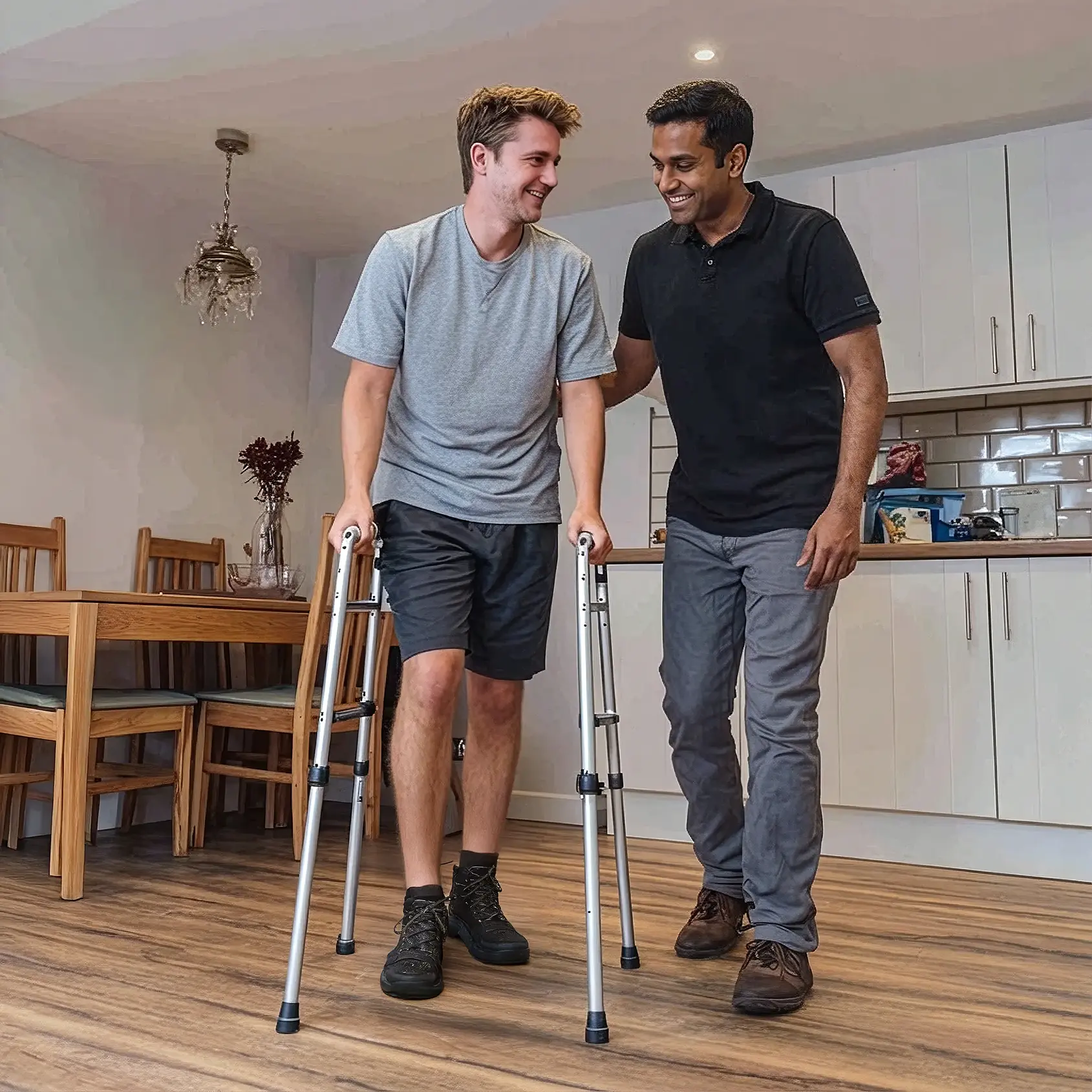Careers
22 Sept 2025
Supporting Life at Home
Community Care for Dementia and Alzheimer’s

When facing a dementia diagnosis, one of the most pressing concerns families have is whether their loved one can continue living at home safely and with dignity. The answer, with the right support in place, is often yes. Modern community care services provide comprehensive, person-centered support that enables people with dementia, Alzheimer’s, and other complex needs to remain in the comfort of their own homes—often alongside their partners and families.
Why home matters more than ever
Home represents far more than just a physical space—it’s where memories live, routines feel natural, and comfort comes from familiarity. For individuals living with dementia, this familiarity becomes crucial. Research consistently shows that remaining in known environments can help reduce confusion, anxiety, and behavioural challenges often associated with dementia progression.
The smell of their favourite tea brewing in their own kitchen, the view from their bedroom window, the comfort of their own bed—these seemingly small details can make an enormous difference in their daily experience and overall wellbeing.
Keeping couples together: a partnership approach
One of the most heart-wrenching decisions families face is when one partner develops dementia while the other remains relatively well. Traditional thinking might suggest that residential care is inevitable, but modern community care services are specifically designed to support couples who want to remain together.
Supporting both partners
Community care recognises that when one person has dementia, both partners need support:
For the person with dementia:
Maintaining daily routines and personal care
Cognitive stimulation activities and safe supervision
Medication management and health monitoring
For the caring partner:
Respite care to prevent caregiver burnout
Emotional support and practical guidance
Professional backup during challenging moments
“We had been married for 52 years when my husband was diagnosed with Alzheimer’s,” shares Margaret. “I was determined we would face this together, but I knew I couldn’t manage alone. Having carers who understood both our needs meant we could stay in our home together for much longer than we ever thought possible.”
The Newcross Approach: Comprehensive Care at Home
At Newcross Healthcare, our community care philosophy centers on maintaining dignity, preserving independence wherever possible, and keeping families together.
Person-Centered Care Planning
Every care package begins with a comprehensive assessment that looks beyond medical needs to understand personal history, established routines, cultural considerations, family dynamics, and individual goals. This holistic approach ensures that care feels natural and respectful rather than intrusive.
Specialised Dementia Support
Our care teams receive specific training in communication techniques adapted for different stages of dementia, positive behaviour management, safety awareness while promoting independence, and cognitive stimulation activities.
Flexible Service Options
Visiting Care: Regular visits timed around daily routines like morning personal care, meal preparation, or evening medication.
Live-in Care: A dedicated carer who becomes part of the household, providing 24-hour support while maintaining the home environment.
Respite Care: Temporary care allowing family caregivers essential breaks.
Complex Clinical Care: For individuals with dementia who also have other health conditions requiring specialized medical support.
Supporting the Whole Family
Community care extends its impact beyond the immediate recipient:
For Adult Children
Regular communication and updates about their parent’s condition
Professional guidance on care decisions
Reduced worry knowing expert support is in place
Quality time with parents focused on relationship rather than caregiving
For Grandchildren
Opportunities to visit grandparents in familiar, comfortable surroundings
Maintained family traditions and connections
Positive modelling of caring for elderly family members
Addressing Common Concerns
Emergency Support: Professional services provide 24/7 on-call support with clear protocols for medical emergencies and family notification.
Consistency: Quality providers focus on matching families with dedicated care teams who build relationships and understand individual needs.
Evolving Needs: Regular assessments ensure support adapts from minimal assistance to comprehensive 24-hour care as requirements change.
Technology Integration: Modern community care incorporates medication management systems, emergency alerts, family communication apps, and health monitoring tools.
Making the Right Choice
When evaluating community care options, consider what matters most to your family member, what support the primary caregiver needs, and how the home environment can be safely adapted to meet changing needs.
The Future is Bright
Community care continues evolving with advances in telehealth integration, smart home technology, specialized training programs, and partnership working with healthcare professionals and local authorities.
Conclusion: Where Love Lives
Choosing community care means prioritizing dignity, familiarity, and family connections. With professional support, many individuals with dementia and their families can navigate this challenging journey while staying rooted in the place they call home.
The goal isn’t to pretend that dementia isn’t happening, but to ensure that when challenges arise, families have access to expert support that enables them to focus on maintaining relationships, preserving dignity, and creating meaningful moments together for as long as possible.
If you’re considering community care options for a family member with dementia or complex needs, every situation is unique, and with the right support, staying at home may be more achievable than you think.
Contact Newcross Healthcare: 0330 054 1110 | referrals@newcrosshealthcare.com

What's the Difference Between a Staffing Agency and a Regulated Care Provider?
And why it matters more than you might think

Why work in healthcare?
7 reasons it could be the right move

Dignity in Action
Why Respect Matters Most in Home Care












